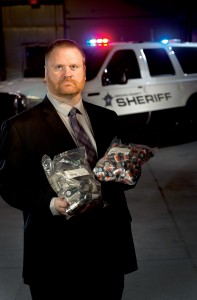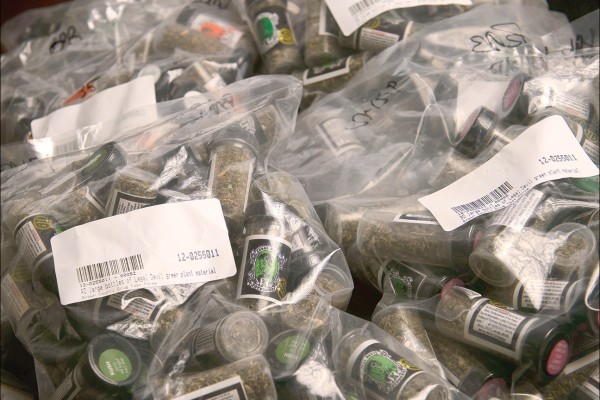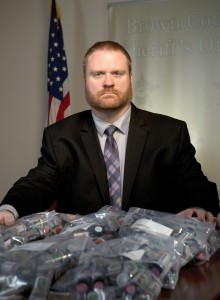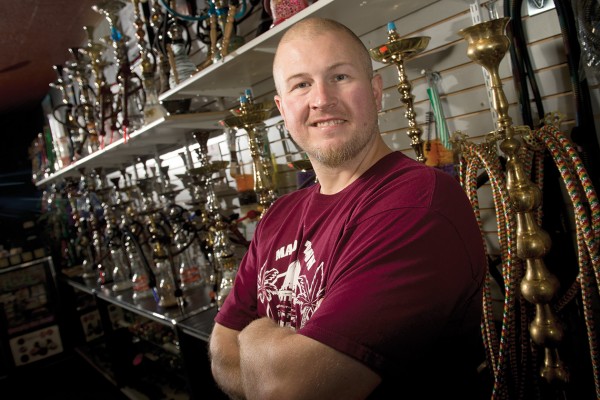Prosecutors, law enforcement frustrated by synthetic drug legislation
By: Dan Shaw, [email protected]//August 19, 2013//
Prosecutors, law enforcement frustrated by synthetic drug legislation
By: Dan Shaw, [email protected]//August 19, 2013//

of synthetic drugs that were seized from a Green Bay smoke shop. Law enforcement and prosecutors are
struggling with how to tackle synthetic drug cases in an ever-changing market. (Staff photos by Kevin Harnack)
Brown County officials had to wait months before prosecuting a man arrested in September on suspicion of selling synthetic drugs.
The reason for the delay, said Lt. David Poteat, of the Brown County Drug Task Force, is no one had said for sure whether the drugs were illegal. A state statute leaves it up to the Wisconsin Controlled Substance Board to determine what belongs on the state’s list of Schedule 1 substances, or those with no generally acknowledged medical benefits and a high likelihood of being abused.
If the board refuses to put a substance on the list, the related prosecution comes to a halt.
The task force in September seized the synthetic drugs from a Green Bay smoke shop. Prosecutors were hesitant, however, to put a lot of time into the case until the board had made a ruling, knowing that a decision against them would unravel whatever work they had done, Poteat said.
But the board only met three times in 2012.
“And we had to wait seven months,” Poteat said, “before we could get before them.”
When the board finally took up the case, the six members placed the drugs on the Schedule 1 list, and Michael A. Denis, 64, is awaiting trial on two counts of manufacturing and delivering synthetic drugs out of his store, Imports Plus.
Poteat said he is aware of other attempts to prosecute suspects. But he also has heard of prosecutors losing enthusiasm or sometimes even refusing to press charges, he said, when they find out how long such cases will take.
To make it easier to prosecute synthetic drug manufacturers and providers, state Sen. Sheila Harsdorf, R-River Falls, and state Rep. Garey Bies, R-Sister Bay, want to revise a 2011 state law banning specific synthetic drugs.
The revision would permit naming the basic chemical structures that appear in almost all synthetic drugs, making it harder for manufacturers to use minor changes in a compound to skirt the law, said Cory Bruce, a research assistant for Bies.
Such a revision, Poteat said, would give the Controlled Substance Board greater guidance on which substances should be scheduled, and it would help prosecutors focus on cases that have better odds of success.
Though the 2011 law forbids dealing in analogs, or compounds that are similar enough to a banned substance to have an intoxicating effect yet are different enough to sidestep the law’s prohibition, the wording is vague.
Many prosecutors have found it difficult to prove an analog meets the legal requirement of being substantially similar to a banned drug.
And despite the ground gained since 2011 in the fight against specific products, such as Spice, K2 and bath salts, the abuse of synthetic drugs still is a problem in Wisconsin. In April, the tribal government of the Lac du Flambeau Reservation in north-central Wisconsin declared a state of emergency after a sharp increase in reports of synthetic drug abuse.

In response, the Native American Drug and Gang Initiative, a group composed of members from several tribal law enforcement agencies, undertook an operation that resulted in the arrest of 25 people believed to be involved in the production, distribution and use of synthetic marijuana. Brandon Thoms, public relations officer for the Lac du Flambeau Tribe, said there has been a rash of overdoses and even a few deaths caused by the drugs.
Thoms said there is evidence suggesting most of the substances came from northern Wisconsin and Minnesota cities, where the products could be bought off store shelves.
“The reports we got were that a few individuals were making that trek and buying large quantities of this substance,” he said, “and selling it on the street at 400 or 500 or 600 percent profit.”

Despite the state of emergency, local law enforcement officials have only recently begun pursuing analog dealers, said Al Moustakis, the district attorney for Vilas County, which was involved in the crackdown. Part of the reason for the delay, he said, was the time needed to test a substance to learn its chemical composition.
Dana Brueck, a spokeswoman for the Wisconsin Department of Justice, said it usually takes the State Crime Lab two to three times as long to test a synthetic drug as it does to test illegal drugs such as heroin and cocaine. And the lab generally confines its work to the eight synthetic cannabinoids, or substances having effects similar to marijuana’s, and two stimulants specifically outlawed by the 2011 law. Analogs, Brueck said, usually are sent to researchers in the U.S. Drug Enforcement Administration, a step that can result in further delays.
Prosecutors also have the sometimes difficult task of finding someone who can show that a suspected analog is indeed chemically similar to a banned substance.
Wendy Lemkuil, a Brown County assistant district attorney who is working with Poteat on the case involving the Green Bay smoke shop, said she relies on chemists and pharmacologists for such verification. But they can be hard to find.
At one time, Lemkuil said, she had planned to turn to a chemist at the U.S. Drug Enforcement Administration for testimony, but later was told his services were needed in the agency’s attempts to add more drugs to the federal schedule of banned substances. Now she is searching for other experts.
Some might appear in court for free, she said, out of a sense of civic duty, but some will demand payment. With options limited, she is considering using a former drug user to testify to the effects of a particular product.
In the Green Bay case, Lemkuil said, she and Poteat found it fairly easy, once they got a hearing before the controlled substance board, to show that two of the products seized from Imports Plus were chemically similar to already banned substances and should be classified as Schedule 1 drugs. Those products were covered in U.S. DEA research showing the substances were analogs.
“Now it won’t be as hard for me to prosecute,” Lemkuil said, “because we keep seeing those.”
But they still will have to contend with what Will Taylor, special agent for the DEA’s Chicago field division, said is the greatest difficulty: proving that products marked “not for human consumption” are actually meant for someone to consume. Often the only way that case can be made is through the use of undercover agents, who can ask questions meant to elicit revealing answers.
“A lot of it is marked as plant food or potpourri,” Taylor said.
The importance of showing the intent behind the manufacture of a substance, and not just its chemical composition, was shown in a recent victory for federal prosecutors. On July 19, Michael Rocky Lane, of Cave Creek, Ariz., was found guilty in federal court of conspiring to make and distribute synthetic drugs.
The case was significant because the crime involved analogs. Lane, according to a press release from the Office of the U.S. Attorney, once sold a product called “Eight Ballz Bath Salts” containing a stimulant the federal government banned in 2011. Lane then found a slightly tweaked replacement and began marketing it as “Eight Ballz Premium Glass Cleaner.”
Ramona Sanchez, special agent and public information officer for the DEA’s Phoenix office, said prosecutors obtained the conviction in part by producing emails that showed the products were meant to get customers high.
As long as the verdict stands on appeal, she said, the case is destined to be a model of how to successfully prosecute analog dealers.
Poteat said undercover officers likewise played a role in bringing charges against the owner of the Green Bay smoke shop. In that case, Poteat said, agents asked questions such as, “How do you make this stuff less harsh?” and elicited responses that made it clear the products were meant to be smoked.
But such techniques only go so far, he said, and without a change to the law, prosecutors and police will remain at a disadvantage.
“It is difficult,” Poteat said. “I’ve talked to other law enforcement officials, and they were very discouraged by the process and the results they had seen. They didn’t have encouraging words.”

Selling in the gray area
The tricks of the trade in selling synthetic marijuana and similar drugs are well known among head-shop owners who want to avoid encounters with the law.
Jason Clark, who sells pipes and rolling papers at his Madison business, Smokes on State, said he can understand why prosecutors struggle going after those who peddle synthetic drugs. Clark said he gave up dealing in Spice, K2 and other substances with marijuana-like effects after police removed about $10,000 worth of the stuff from his store after legislation banning the products in 2011.
Most of his competitors also pulled the products from their shelves, he said. But those who keep up the trade usually know to avoid telling customers that the products can produce intoxicating effects or allowing anything labeled “not for human consumption” to be bought alongside pipes or other paraphernalia commonly associated with illegal drugs.
Clark said most sellers also know that as soon as certain substances are banned, “25 chemicals are out there ready to replace them.”
The 2011 legislation, he said, drove most synthetic drug sales to the Internet or into the street. But the profits to be made from substances that skirt the law always will be a temptation, he said, for sellers willing to work in a legal gray area.
“It’s hard,” he said, “to walk away from.”
— Dan Shaw
Legal News
- History made in Trump New York trial opening statements
- Prosecutor won’t bring charges against Wisconsin lawmaker over fundraising scheme
- Republican Wisconsin Senate candidate says he doesn’t oppose elderly people voting
- Vice President Harris to reveal final rules mandating minimum standards for nursing home staffing
- Election workers fear threats to their safety as November nears
- Former law enforcement praise state’s response brief in Steven Avery case
- Eric Toney announces re-election bid for Fond du Lac County District Attorney
- Former Wisconsin Democratic Rep. Peter Barca announces new bid for Congress
- Republicans file lawsuit challenging Evers’s partial vetoes to literacy bill
- More human remains believed those of missing woman wash up on Milwaukee Co. beach
- Vice President Harris returning to Wisconsin for third visit this year
- Wisconsin joins Feds, dozens of states to hold airlines accountable for bad behavior
WLJ People
- Power 30 Personal Injury Attorneys – Russell Nicolet
- Power 30 Personal Injury Attorneys – Benjamin Nicolet
- Power 30 Personal Injury Attorneys – Dustin T. Woehl
- Power 30 Personal Injury Attorneys – Katherine Metzger
- Power 30 Personal Injury Attorneys – Joseph Ryan
- Power 30 Personal Injury Attorneys – James M. Ryan
- Power 30 Personal Injury Attorneys – Dana Wachs
- Power 30 Personal Injury Attorneys – Mark L. Thomsen
- Power 30 Personal Injury Attorneys – Matthew Lein
- Power 30 Personal Injury Attorneys – Jeffrey A. Pitman
- Power 30 Personal Injury Attorneys – William Pemberton
- Power 30 Personal Injury Attorneys – Howard S. Sicula











